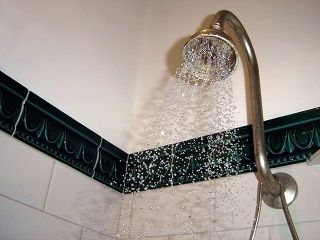From Guest Blogger Izzie: Environmental Aspects of Showers vs. Baths–Myths and Facts

This article is designed to dispel all of the myths you might have heard and instead give you all of the facts you need to make an informed decision as to whether it is better to use a shower or bath.
MYTH: It is always cheaper and better for the environment to take a shower over running a bath.
This could not be further from the truth, in fact a power shower can use up to twice as much water and energy as a standard bath, therefore being twice as bad for the environment than a bath would have been. To add to this, people take more showers more frequently, than they would take bath, whereas people will typically have one to three baths a week to keep clean others will shower every day, sometimes more than once a day. Of course, other factors also play a role in this myth, a 10 minute low flow shower will almost always be considerably cheaper than a bath, however, longer showers, or showers such as a power shower, will use more energy and water than a bath might.
MYTH: Taking a shower is cheaper in energy bills than running a bath
This may not always be true, depending on what heating system you have, along with the kind of shower you are using. For example, if you have an electric shower that heats the water by electric rather than by gas and with the current electricity rates being higher than those of gas, you might find it actually costs you more to have a shower than a bath.
FACT: According to the Daily Mail and the BBC, the average 8 minute shower uses approximately 62 litres of water, with a power shower using up to 136 litres, whereas an average bath will use 80 litres of water.
This means if you have an 8 minute shower, or a shower that is even shorter, such as a 4 minute shower, you are certainly saving money, energy and protecting the environment. Even by using a power shower, if you limit your showers to 4 minutes you will be saving money and energy.
FACT: Installing a water efficient showerhead will save money on energy bills, in turn saving water and the environment.
Buying a water efficient shower head is incredibly cheap, costing approximately £30, this means you make the money back you spent on the showerhead in your first year of energy savings alone. These showerheads are designed to reduce the amount of water you use and waste during a shower.
FACT: If you live in a property that does not have a shower, therefore you have no choice but to take regular baths, you can reduce water and energy wastage by running a shallow bath.
By only using the water you need and not filling the bathtub to the top, you can save an incredible amount of water and energy each year, making a bath closer to taking a shower, in terms of energy and water usage.
To test this out, why not put the plug in next time you take a shower and see for yourself how much water and energy you actually save.

There are 3 things I do to make my showers more efficient.
1. I have a bucket in the shower to collect the water I run to get the hot water up. I use this to flush the toilet.
2. For less than $5.00 I purchased a small valve that goes right before the shower head. It allows you to switch between full flow and a tiny trickle so the shower is not running at full rate when you don’t need it like when you are soaping and washing. The reason it leaves a very small trickle is to keep the water from going cold. I put the bucket to collect this small stream also so that water does not go to waste either.
3. I have a heat exchanger that takes the heat out of the drain water and uses it to preheat the water going into the water heater so that does not get wasted down the drain.
Brian